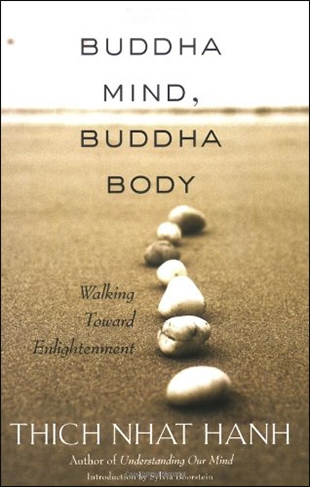Thich Nhat Hanh is a Buddhist monk, poet, scholar, and human rights activist. He is the author of more than 100 books, 60 in English. In this paperback that mixes essays on mindfulness with down-to-earth spiritual practices. He reveals the richness of inter-being as a linchpin for understanding the human adventure and the ties that bind us to each other and to the natural world.
In many references to walking meditation, Thich Nhat Hanh makes it clear that this simple practice has many dividends. As we move slowly on the earth, we focus on the present moment and breathe in all the wonders that surround us. Walking with friends and even with strangers, we become one with each other. Thich Nhat Hanh suggests that we call upon our physical ancestors from previous generations and have them join us in our mind's eye. We can also ask our spiritual teachers to walk with us. Through all of this we let go of the idea that we are separate from anyone or anything.
Mindfulness is another recommended spiritual practice. Thich Nhat Hanh notes that many people program a bell of mindfulness in their computer so that every ten or fifteen minutes there's a sound to remind them to stop and enjoy breathing and smiling and not getting lost in their work. Another practice of mindfulness is befriending our negative habit energies when they arise. He suggests saying: " 'Oh my dear habit energy, you are a long-time friend of mine. I know you too well. I will take good care of you.' With that kind of mindfulness, you retain your freedom. You are no longer a victim of your habit energy."
A third mindfulness practice is to note the link between our heart and the sun. We do everything we can to take care of our heart since it plays such an important role in the health and well-being of our body. The sun has a similar role; if it were to stop operating, we would die. So Thich Nhat Hanh makes a practice of seeing the sun as his heart and concludes that taking good care of the environment is taking care of ourselves.
This teacher shows us how to train our minds and to create the best conditions for happiness. One practice for helping our heart grow big ably demonstrates Thich Nhat Hanh's remarkable ability to take a simple metaphor and expand it into a very understandable application for our daily life:
"How can we help our hearts to grow every day, to be able to embrace everything? The Buddha gave a very beautiful example. Suppose you have a bowl of water and someone put a handful of salt in the bowl of water; it would be too salty for you to drink. But suppose someone threw a handful of salt into a clear mountain river. The river is deep and wide enough that you can still drink the water without tasting the salt.
"When your heart is small, you suffer a lot. But when your heart becomes bigger, very big, then the same thing does not make you suffer anymore. So the secret is how to help your heart to grow. If your heart is small, you can't accept that person, you can't tolerate him or her with his or her shortcomings. But when your heart is big, you have a lot of understanding and compassion, and then there is no problem, you don't suffer, and you embrace him or her because your heart is so big.
"We suffer because our heart is small. And we demand that the other person should change in order to be accepted by us. But when our heart is large, we don't put forth any conditions, we accept them as they are, and they have a chance to transform. The secret is how to grow our hearts. The practice of understanding helps the energy of compassion to arise. When compassion is there, we don't suffer anymore. We suffer because we don't have enough compassion. The moment when we have a lot of compassion, there is no suffering anymore. We encounter the same types of people, we encounter the same situations, but we don't suffer anymore because our love is so large.
"Helping our heart to grow big, kshanti paramita, is the capacity of embracing everyone, everything, you don't exclude anyone. In true love, you don't discriminate anymore. Whatever a person's color, religion, or political beliefs, you accept them all with no discrimination whatsoever. Inclusiveness here means nondiscrimination."
